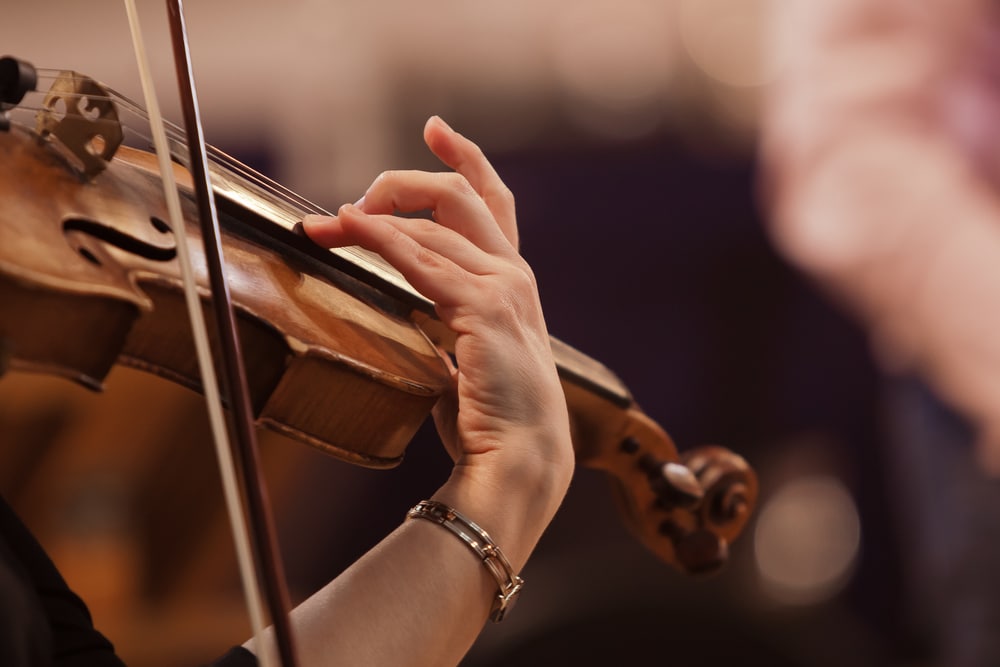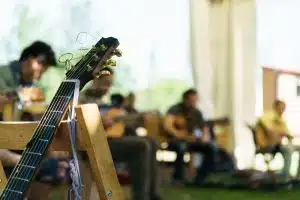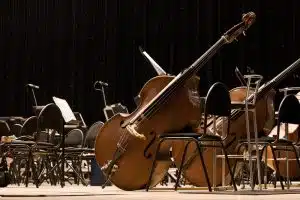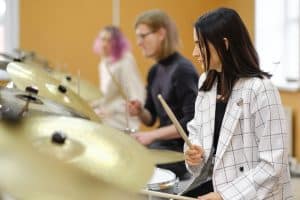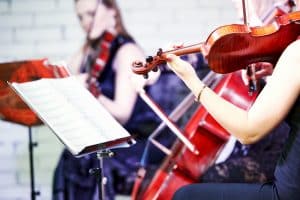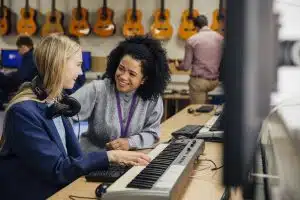Berklee Global String Program
Welcome to a place where your passion for string music takes center stage – the Berklee Global String Program! Here, every stroke of the bow and each pluck of a string brings music to life.
Designed for those who love string instruments and are eager to expand their skills, this program is an opportunity to dive deep into the world of music.
Through this blog, we’ll explore everything you need to know about the Berklee Global String Program, from its benefits to the application process. Get ready to discover how this program could be the key to unlocking your musical potential.
What is the Berklee Global String Program?
Get the chance to learn from top string musicians and teachers from around the world. Led by David Wallace, the head of Berklee’s String Department, this program covers a diverse range of string music styles.
You could learn anything from folk, jazz, and bluegrass to classical, pop, R&B, and even global music genres. Whether you play the violin, viola, cello, mandolin, harp, banjo, or other string instruments, you’ll have the opportunity to improve your skills. Plus, you’ll get to explore different musical styles and techniques, all with the support and guidance of experienced instructors.
Berklee Global String Program Curriculum Overview
Joining the Global String Program at Berklee means immersing yourself in a dynamic and creative string community for an entire week. This is the same environment that nurtured talents like Sierra Hull, Casey Driessen, Luke Price, and Alex Hargreaves. Here’s what the curriculum includes:
Styles Lab: Every day, you’ll experience different musical styles. Different faculty members, each with their own unique expertise and approach, will guide you. They’ll offer a wide range of perspectives and techniques, giving you a well-rounded understanding of various musical genres. This is an opportunity to broaden your musical skills and knowledge daily under the mentorship of seasoned professionals.
Theory-in-Action Labs: In these practical-focused sessions, you’ll be actively involved in learning how to train your ear and apply music theory directly to your instrument. The aim is to provide you with real, hands-on experience.
To ensure a steady and effective learning process, you will be part of the same group and work with the same instructor every day. This consistency helps in building a solid foundation and understanding of music theory, making your learning experience well-organized and progressive.
Small Ensemble: You’ll be part of a small group, led by a Berklee faculty expert in a specific music style, such as Arabic, bluegrass, Celtic, jazz, or pop. This intimate setting is perfect for detailed, style-specific learning.
The small group setting is ideal for in-depth learning, allowing you to delve deeply into the specifics of a particular musical genre. With close attention from an expert in that style, you’ll have the opportunity to refine your skills and gain a thorough understanding of the nuances and techniques unique to that style of music.
Large Ensemble: Here, you’ll join a bigger group to play a variety of pieces at the Berklee Performance Center. It’s a chance to experience the thrill of larger-scale performances!
Faculty Clinics: In these unique sessions, Berklee’s experienced faculty members will lead special workshops and discussions. These clinics are designed to sharpen your professional skills in the music industry, enhance your performance abilities, and expand your knowledge across a diverse array of musical genres.
You’ll get insights into various aspects of a music career, from performance tips to navigating the industry. These clinics are an invaluable opportunity to learn from seasoned professionals, offering a broad perspective on the world of music and providing you with tools and techniques that are essential for any aspiring musician.
Jam Sessions: Each evening, the program offers lively jam sessions where current students at Berklee, the faculty, and those attending the summer program gather to make music together.
These sessions cover a wide array of music genres including old-time music, swing, pop, rock, R&B, among others. These jam sessions are not only enjoyable but also provide a great interactive platform for practice and learning.
It’s a chance to collaborate, experiment with different styles, and improve your musical skills in a relaxed and engaging environment. These sessions are perfect for trying out new techniques, getting comfortable with various genres, and enjoying the experience of playing music with others.
The curriculum of the Berklee Global String Program is thoughtfully crafted to provide a thorough and captivating educational journey, encompassing every facet of string music and its performance. This program aims to deliver a well-rounded experience, ensuring that you gain deep insights into the wide world of string instruments. It covers everything from the basics to advanced techniques, blending theoretical knowledge with practical application.
Whether you’re looking to improve your skills, learn new styles, or just deepen your understanding of string music, this curriculum is structured to meet those needs, making sure that every aspect of your musical growth is addressed.
Why Should You Join the Berklee Global String Program?
Enrolling in the Berklee Global String Program means stepping into an environment where the limits of music are constantly being expanded and reimagined. This program will help improve your ability to play string instruments and ultimately grow as a complete musician. You’ll develop a wide range of skills, from perfecting your technique to exploring your creative potential.
In this program, you’ll get the chance to work and play alongside fellow music enthusiasts who share your passion for string instruments. Imagine collaborating on a jazz project with a violinist, or learning about Celtic rhythms from a skilled cellist! These experiences will not only enrich your understanding of music but also build lasting connections in the industry.
You’ll also learn directly from experienced professionals in the music world. These are people who have been where you are and have achieved success in their fields. They can offer real-world advice and insights that you can’t find in a textbook.
The diversity of music styles you’ll encounter is another highlight. One day, you could be delving into the intricacies of classical music, and the next, you might be experimenting with the lively rhythms of bluegrass or the soulful melodies of R&B. This exposure to a wide range of musical genres will broaden your perspective and open up new avenues for artistic expression.
Moreover, the Berklee Global String Program is a place that nurtures both your personal and professional growth. You’ll develop not just as a musician, but as a performer, a collaborator, and an artist. The skills and experiences you gain here will be invaluable as you continue your journey in the world of music.
Global String Program Performance Opportunities
Throughout the program, students will have numerous chances to showcase their talents and skills. One of the main highlights is the open jam sessions held every evening. These sessions are an opportunity for you to experiment with different styles and genres. Whether it’s jazz, classical, or contemporary music, you’ll get to play, improvise, and collaborate with other students, making each session a unique and exciting experience.
The program builds up to a grand finale with final performances scheduled for the last day. This is where you get to shine, performing the pieces you’ve been practicing in your ensembles. It’s a chance to demonstrate all the hard work, learning, and progress you’ve made during the program.
These performances are a celebration of your achievements and a valuable experience in playing in front of an audience, an essential skill for any musician. This culmination of the program is a memorable event that showcases the diverse talents and skills developed by students throughout their time at Berklee.
How Do You Get Into the Berklee Global String Program?
The Berklee Global String Program is open to all students who are 15 years of age or older. This includes both high school and college students, as well as adults who are interested in enhancing their musical skills.
One key requirement for joining this program is a good understanding of English. Participants need to have a proficient level of English because all the classes, materials, and assignments are in English.
While it’s not necessary to submit any official proof of your English skills like TOEFL, IELTS, or Duolingo scores, you should be comfortable enough with the language to follow along in classes, understand the instructions, and engage in discussions. This ensures that you can fully participate in and benefit from the program.
Gaining entry into this program requires a blend of talent, dedication, and preparation. Prospective students must demonstrate proficiency in their chosen string instrument and show a deep commitment to musical excellence.
Ideal Extracurriculars for Aspiring Berklee Global String Program Attendees
For aspiring attendees of the Berklee Global String Program, engaging in certain extracurricular activities can significantly enhance your skills and increase your chances of success. Here are some ideal extracurriculars:
Join a School Band or Orchestra: Joining your school’s band or orchestra is an excellent opportunity to learn how to play music with a group. This experience teaches you how to work with other musicians and enhances your skills in playing together in sync.
Being part of a band or orchestra not only improves your musical abilities but also helps you get better at understanding and contributing to the overall sound of a group.
Take Part in Local Music Competitions: Being involved in music contests in your area is a great way to display your musical skills and get valuable advice from judges who know a lot about music.
These competitions are also good practice for performing in front of an audience, which is a key part of the Berklee program. They help you learn how to handle stage presence and pressure, which are important skills for any musician.
Enroll in Private Music Lessons: Taking private music classes, particularly in string instruments, is very beneficial. In these classes, you get one-on-one attention and guidance that’s tailored to your specific needs and skill level.
This personal approach allows you to learn more advanced techniques and fine-tune your abilities in playing your instrument. These lessons can be a significant boost in improving your musical proficiency.
Attend Music Workshops and Camps: Joining music workshops and camps can be a great way to deepen your understanding of music. These events usually involve concentrated training sessions where you can learn about different music styles, like jazz, classical, or folk, and various playing techniques.
For example, a violin workshop might focus on specific bowing techniques, while a camp could offer a broader range of activities, like group performances or theory classes. These experiences not only expand your knowledge of music but also give you a chance to practice and apply what you learn in a supportive and immersive environment.
Volunteer to Perform at Community Events: Playing your instrument at community events is a great way to get more experience performing in front of people. This can include events like local festivals, charity fundraisers, or town gatherings.
You can play the violin at a community art fair or join a group performance at a local charity event. This not only helps you become more confident on stage but also allows you to connect with various types of audiences. Performing in your community can be rewarding as it brings music to local events and helps you become more involved in your town or city.
Start a Music Club or Join an Existing One: Becoming a member of a music club, or even starting one if there isn’t an existing club at your school or in your community, is a fantastic way to regularly practice and work together with others who also love music.
You could join a string ensemble club at school where you practice with other violinists, cellists, or guitarists. Or, if you start your own club, you could organize weekly meetings to discuss different music genres, practice together, or even plan small performances.
Being in a music club encourages consistent practice and offers a supportive environment where you can share ideas and learn from your peers.
Explore Different Music Genres: Broaden your musical horizons by immersing yourself in different music genres. This includes exploring genres you might not be very familiar with. If you primarily play classical violin, try listening to jazz, bluegrass, or even world music. You can experiment with different genres by learning to play songs from those styles on your instrument.
This exploration enriches your musical versatility and opens up new creative possibilities. It allows you to adapt and blend elements from various genres into your own unique musical style, which can be a valuable skill when you attend the Berklee Global String Program.
Compose and Arrange Music: If you have a passion for making your own music, then learning how to compose and arrange music can be an important skill to cultivate. This involves coming up with your melodies, harmonies, and musical structures, as well as arranging existing pieces to suit your style.
For example, you could compose a piece for your string instrument or rearrange a popular song to give it a unique twist. By delving into composition and arrangement, you gain the ability to express your musical ideas and creativity, which can be a significant asset when you participate in the Berklee Global String Program.
Record and Share Your Performances: If you have a passion for making your own music, then learning how to compose and arrange music can be an important skill to cultivate. This involves coming up with your melodies, harmonies, and musical structures, as well as arranging existing pieces to suit your style.
You could compose a piece for your string instrument or rearrange a popular song to give it a unique twist. By delving into composition and arrangement, you gain the ability to express your musical ideas and creativity, which can be a significant asset when you participate in the Berklee Global String Program.
Network with Local Musicians and Attend Concerts: Building relationships with experienced musicians from your community can offer valuable insights into the music industry. Going to concerts and live music performances can be highly inspiring.
You can join local musician meetups or follow social media groups where artists share their experiences and advice. Attending live music events in your town or city, whether it’s a small gig at a local club or a big concert in a stadium, can expose you to different styles and performers, motivating you to explore new musical avenues. These connections and experiences can be beneficial as you pursue your dream of participating in the Berklee Global String Program.
Remember, the goal of these extracurriculars is not just to enhance your application, but to genuinely grow as a musician and prepare you for the intensive learning environment at Berklee.
How Do I Apply to the Berklee Global String Program?
Registration Submission: You need to register by May 1. Start by filling out the online registration form (which opens in a new window). Depending on your situation, you might also have to send in some extra documents or information.
Tuition Payment: Also by May 1, you should pay the full tuition amount. Since each program only has a certain number of spots, completing your tuition payment ensures your place is secured.
Housing Request: If you’re 15 or older when the program starts, you can apply to live in the on-campus housing. To do this, if you’re eligible and interested, go back to your registration portal and fill out a Residence Hall Agreement.
I. Next Steps Checklist for Program Preparation
After registering for your program, use this checklist to ensure you’ve completed all necessary steps for a smooth check-in process.
- Since all programs have limited spaces, it’s important to pay your full tuition as soon as possible. This secures your spot in the program. You can make the payment online.
- If you are 15 or older by the start of the program in Boston and wish to stay on campus, submit a Residence Hall Agreement. Remember, if you’re attending more than one summer program, you need to fill out and pay for each program’s housing separately. Space in the residence halls is limited, so apply and complete your payment early.
- Berklee requires up-to-date health information and mandatory immunization records as per Massachusetts law. You will also need to complete conduct and consent forms. Instructions for accessing your Magnus Health account will be emailed in mid-spring. Make sure to submit the following through your Magnus Health Portal:
- Parent/Guardian consent for medication administration.
- Medication order signed by a healthcare provider.
- You’ll receive an ID card when you arrive at Berklee, which grants access to campus facilities and, if you’re staying in the residence halls, to the dining hall. Upload your photo for the ID card beforehand; otherwise, your photo will be taken upon arrival.
- Some programs require a short video to determine your appropriate class level. Check the class placement submission form for details and submit your video at least two weeks before your program starts. Late submissions may result in placement at an incorrect level.
Keep an eye on the email you used to enroll in the program for important updates. You’ll receive a detailed check-in email with information about your arrival location, housing assignment, and program schedule about one to two weeks before the program starts.
A week before your program begins, you’ll get instructions to download the CrowdCompass Events app. This app will help you view your schedule and connect with other students in the Summer Programs.
Remember, staying informed and preparing in advance will help ensure you have a smooth and enjoyable experience in the program.
How Hard is Getting Into the Berklee Global String Program?
This program can only accept a limited number of participants. Just submitting your registration documents doesn’t ensure you’ll get to join the program. The only way to confirm your place is by paying the full fee.
Once the program fills up, anyone who hasn’t paid the entire amount will be put on a waiting list. So, to make sure you get a spot, it’s important to complete your payment as soon as possible.
I. Berklee Global String Program Cost
Program Fee: $1,295. However, if you register before January 15, 2024, you can take advantage of a reduced fee of $1,09!
Accommodation: $895 for the duration of the program.
Registration Charge: There’s a one-time, non-refundable fee of $50 for signing up.
When is the Deadline to Apply to the Berklee Global String Program?
The deadline to apply for the Berklee Global String Program is May 1st. This means you need to finish and submit your registration by this date.
It’s also important to complete the payment of your tuition fees by the same deadline, May 1st. Both your registration and tuition payment should be completed by this date to secure your place in the program.
When Do I Find Out About My Application to the Berklee Global String Program?
Regarding the timeline for application decisions for the Berklee Global String Program, Berklee College of Music doesn’t set a specific date by which applicants will be informed about the status of their applications.
Nonetheless, it’s important to remember that all participants need to complete their registration process by May 1st. This means you should submit all necessary materials and forms by this date. While waiting for a decision, make sure your registration is fully completed by the deadline to maintain your eligibility for the program.
Where is the Berklee Global String Program Held?
The program takes place at the Berklee College of Music, located in Boston, Massachusetts. This vibrant city, known for its rich musical culture, offers an ideal backdrop for the program, providing an inspiring and creative environment for students.
Campus Visit Before the Program
Berklee Summer Programs doesn’t organize or provide any tours of the campus. However, if you’re interested in seeing the campus before your program starts, we strongly suggest setting up a tour through the Berklee College of Music Admissions Department or the Boston Conservatory at Berklee.
If you’re a student or parent wanting to visit Berklee College of Music, you can check out available tour dates and sign up for a tour.
If you’re looking to tour the Boston Conservatory at Berklee, registration for these tours is also available through their website.
Keep in mind that tours are usually available on weekdays, Monday through Friday, between 10 AM and 4 PM Eastern Time. This is a great opportunity to get a feel for the campus environment and facilities before you begin your program.
When Does the Berklee Global String Program Take Place?
The Berklee Global String Program is set to occur from June 24th to June 28th. During this period, participants will engage in the full range of activities and curriculum designed for the program.
It is scheduled during the summer, making it a perfect opportunity for students to immerse themselves in their musical pursuits without the distractions of regular academic commitments.
How Long is the Duration of the Berklee Global String Program?
The Global String Program is an intensive, week-long experience where participants immerse themselves in the vibrant string community of Berklee. During this period, they engage in a comprehensive curriculum that encompasses various aspects of string music.
A Day in the Life of a Global String Program Attendee
Here’s an example of what a usual day might look like in the Berklee Global String Program. Keep in mind that this is just a sample, and the actual schedule can vary.
Morning (9 AM to 1 PM): Your day starts with a mix of activities including playing in ensembles, learning music theory, and attending style labs. This is where you get hands-on experience and in-depth learning in various music styles.
Lunch Break (1 PM to 2 PM): You’ll have an hour to enjoy lunch, take a break, and make the most of this ideal opportunity to socialize with your fellow program attendees. It’s the perfect time to forge new friendships, bond over your shared love for music, and lay the foundation for future networking opportunities.
Share musical experiences, exchange ideas, and connect with like-minded individuals who share your passion for string instruments and music. Lunchtime becomes not only a chance to refuel but also a time to foster meaningful connections within the vibrant Berklee Global String Program community.
Afternoon (2 PM to 6 PM): The afternoon session is dedicated to more ensemble work. This is where you practice and refine your performance as part of a group.
Dinner Time (6 PM to 7 PM): After a busy afternoon, you get an hour to have dinner and relax.
Evening (7 PM onwards): The evening starts with a Master Class from 7 PM to 7:50 PM. This is followed by either a faculty concert or a presentation from 8 PM to 8:30 PM, giving you a chance to see professional performances and learn.
The day concludes with jam sessions from 8:35 PM to 9:20 PM, where you can play, experiment, and collaborate in an informal setting.
Please note that this schedule is flexible and subject to change. It’s designed to provide a balanced mix of structured learning and creative exploration, ensuring a fulfilling and productive day.
A. What to Bring to the Program
Here’s a detailed list of items you should pack for the Berklee Global String Program:
Musical Instruments and Gear
- Bring your primary instrument (like a violin, viola, cello, etc.), along with any necessary accessories like rosin and a bow.
- Spare strings for your instrument, in case you need replacements.
- If you use any effect pedals, especially during jam sessions, don’t forget to pack them.
Music Tools and Stationery
- A tuner and metronome are essential. You can also use apps on your phone for these functions.
- Carry a portable recording device – your phone might have this capability.
- Always have a notebook, staff paper, and pencil for jotting down notes, music, and ideas.
For Pianists and Drummers
- Unlike other musicians, pianists and drummers are not required to bring their instruments. Berklee provides these at the Summer Programs.
B. Packing for On-Campus Stay
If you’re staying on campus, there’s a separate packing list available that includes additional items you might need during your stay. This list can be found in our knowledge base article and covers things like personal care items, clothing, and more.
To ensure you have everything you need for a successful and comfortable experience, review our comprehensive list of instruments and gear on the Berklee website. Proper preparation is key to making the most of your time at the program.
C. Traveling with Instruments for Berklee’s Summer Programs
When you’re coming to Berklee’s Summer Programs, bringing your instrument and gear needs careful planning, especially if they’re large or special items. Here’s a guide on what to bring based on your primary instrument:
General Guidelines for Instruments and Gear
Most students, except pianists and drummers, should bring their own instruments.
Contemporary Vocalists: You need to bring a low-impedance microphone and its cord. Check out the Voice Department’s page for recommended microphones.
Drummers: Bring your sticks and brushes. Feel free to bring your own cymbals, hi-hat, and clutch, but these are also available at the program.
Guitarists and Electric Bassists: Bring your cables and foot pedals. Amplifiers are provided during classes, but you might want to bring a small practice amp with headphones for private practice.
Keyboardists: If you want to use a synthesizer for group work or solo practice, you’re welcome to bring it.
Electronic Digital Instrumentalists (EDI): Make sure to bring a computer with Ableton Live and a MIDI keyboard.
Music Producers (in Music Production or Electronic Music Production and Sound Design Workshops): You’ll need a computer with digital audio workstation (DAW) software (like Ableton Live, Pro Tools, Logic, etc.) and a MIDI Keyboard.
Acoustic Bassists: If available, you can use storage lockers on campus. Unfortunately, Berklee can’t provide storage for other types of instruments.
Flying with Instruments
- If you’re flying to Berklee, use a hardshell case for better protection. Put your name, phone number, and Berklee’s address on the case. Adding “fragile” stickers and a note inside for luggage inspectors is also a good idea.
- If your instrument is valuable, make sure it’s insured.
- Always check with your airline about their policies for transporting instruments.
- This guide should help you prepare for traveling to the program with your instruments and gear. Making sure you have everything you need for your specific instrument will ensure a smoother experience when you arrive at Berklee.
Balancing Fun and Learning in the Global String Program
Summer programs are a fantastic opportunity to grow both academically and personally. They offer a chance to dive deep into your passion while also enjoying a break from your regular routine. When it comes to the Berklee Global String Program, striking the right balance between fun and learning is key to ensuring a productive yet enjoyable summer educational experience.
Getting the most out of your summer program experience at Berklee is essential. You want to leave with improved skills, a deeper understanding of music, and cherished memories. Here’s how you can achieve that ideal balance:
Embrace Your Passion
Above all else, keep in mind the driving force behind your presence here: your deep affection for string instruments and the world of music. The Berklee Global String Program is expertly designed for individuals who have a strong passion for strings. Utilize this opportunity to completely immerse yourself in your musical passion.
Stay Committed to Learning
Although the program presents a wide array of thrilling activities and chances to socialize, it’s essential not to lose sight of your main objective: improving your musical expertise. Attend classes with enthusiasm, engage in diligent practice, and absorb as much knowledge as you can. This unique opportunity allows you to learn from some of the most accomplished professionals in the industry.
Collaborate and Connect
One of the key attractions of summer programs is the opportunity to connect with individuals who share your passions. Collaborate with fellow participants, exchange creative ideas, and together, craft wonderful music. These connections have the potential to bring enrichment to both your professional and personal life.
Explore Beyond Your Comfort Zone
While it’s essential to concentrate on your chosen instrument, don’t hesitate to venture into uncharted musical territory. Berklee presents a rich and diverse musical landscape, encompassing genres from jazz to classical to pop. Seize this chance to explore new genres and techniques, broadening your musical horizons.
Enjoy the Summer Vibes
Summer is synonymous with enjoyment, and Berklee understands that well. They arrange concerts, jam sessions, and various other enjoyable activities. Be sure to engage in these events. They not only inject a sense of fun into your experience but also provide you with opportunities to exhibit your musical talents.
Balance Your Schedule
Striking the perfect balance between classes, practice sessions, and leisure time is of utmost importance. Construct a schedule that caters to your learning objectives while also allowing you ample time for relaxation and rejuvenation.
Finally, remember to savor every moment. Summer programs pass by quickly, so make the most of your time. Build memories, make friends, and leave with a sense of fulfillment.
The Berklee Global String Program is a unique opportunity to grow as a musician and have an unforgettable summer. By embracing your passion, staying committed to learning, connecting with others, and enjoying the vibrant summer atmosphere, you can strike the perfect balance between fun and education, ensuring a productive and enjoyable summer educational experience.
Leveraging Berklee Global String Program Resources for Academic Success
Berklee’s Libraries
Berklee’s libraries serve as invaluable havens for your academic journey. Among these, the Stan Getz Library and the Learning Center stand out as essential resources.
Inside these libraries, you’ll discover an extensive and diverse collection of music scores, books, recordings, and a wealth of digital resources. It’s like a treasure trove for musicians, with materials spanning various genres and eras.
Accessing these resources is straightforward, and our libraries are designed to make your research and practice seamless. Learn how to navigate the library catalog, find specific materials, and make the most of digital tools. Whether you’re seeking inspiration for your compositions or diving into music history, these libraries are your academic allies.
Campus Facilities
Berklee’s campus facilities are where the magic of music truly comes alive. From top-notch practice rooms to cutting-edge recording studios and stunning performance spaces, you have access to it all.
These facilities are designed to meet the needs of musicians at every level. Practice rooms offer acoustic perfection, recording studios are equipped with the latest technology, and performance spaces provide the ideal backdrop for showcasing your talent.
As a string musician, you will find specialized equipment and technology tailored to your needs. From high-quality amplifiers for electric strings to premium recording equipment for acoustic ensembles, we have it covered.
Exploring Boston: A Cultural Extravaganza
Boston is a city teeming with culture and history, and as a Berklee Global String Program attendee, you’re in for a treat. The city boasts a vibrant cultural scene, with something for everyone.
Explore world-class museums like the Museum of Fine Arts, where you can immerse yourself in artistic masterpieces. Attend captivating performances at theaters like the Boston Symphony Hall or catch a Red Sox game at the iconic Fenway Park.
Take a step back in time by walking the Freedom Trail, a route that leads you to significant historical sites. Discover the rich history of the American Revolution and witness landmarks like the Old North Church and Paul Revere’s House.
Being a student at Berklee has its advantages. Many cultural venues offer student discounts, making it affordable to experience the best of Boston’s cultural offerings.
Navigating the city is easy with various transportation options, including the subway system (known as the “T”) and buses. We’ll provide you with tips on how to get around conveniently.
Diving into Boston’s Music Scene
Boston has a storied musical heritage that has left an indelible mark on various genres. As a Berklee Global String Program participant, you have the chance to immerse yourself in this vibrant music culture.
Boston’s musical legacy spans centuries, from classical compositions to the rock ‘n’ roll revolution. It’s a city where legends like Aerosmith, Boston, and The Dropkick Murphys made their mark. Explore how this rich history has shaped today’s diverse music scene!
Boston is dotted with music venues, clubs, and open mic nights where you can showcase your talents. From the intimate charm of Club Passim to the iconic House of Blues, there’s no shortage of places to perform and connect with fellow musicians.
Building connections within Boston’s music community can open doors to exciting opportunities. Collaborate with local artists, attend industry events, and tap into the city’s resources to fuel your musical journey.
Time Management and Self-Care
Maintaining a healthy balance between your academic pursuits and personal well-being is key to thriving at the Berklee Global String Program. Here’s some practical guidance to help you navigate this crucial aspect of your journey:
With a busy schedule, it’s vital to manage your time wisely. Prioritize your classes, practice sessions, and assignments. Create a daily or weekly schedule to stay organized and ensure you’re dedicating ample time to your studies.
Remember that taking care of yourself is your priority. Engage in regular physical activity, whether it’s a jog around campus or yoga in your room. Find relaxation techniques that work for you, such as meditation or deep breathing exercises. A well-rested and healthy body is more conducive to learning.
Nutrition plays a significant role in your overall well-being. Explore the diverse dining options on campus, from wholesome meals to snacks that fuel your creativity. Stay hydrated and make mindful choices when it comes to your diet.
Berklee provides access to mental health resources to support your emotional well-being. Whether you need someone to talk to or guidance on managing stress, there are professionals and services available to assist you.
Berklee’s Support Services: Your Success Partners
At Berklee, they are committed to your success, and that’s why they offer a range of support services to ensure you get the most out of your academic journey and prepare for a bright future in music. Here’s how their support services can benefit you:
The experienced academic advisors are here to help you navigate your educational path. Whether you need assistance with course selection, or academic planning, or have questions about your major, they are ready to provide guidance and ensure you make the most of your time at Berklee.
If you ever find yourself facing academic challenges or need additional help with your coursework, don’t worry. Berklee offers tutoring and academic support resources to assist you in mastering your subjects and excelling in your studies.
Berklee’s career services are designed to empower you as you go on your musical journey beyond the program. From resume-building to networking opportunities, the career advisors are dedicated to helping you shape your musical career and connect with industry professionals.
Final Thoughts
The Berklee Global String Program is the intersection of your talent and a world of opportunities, where your passion aligns with expert guidance. Whether your dreams involve becoming a soloist, a chamber musician, or venturing into uncharted musical territories, this program equips you with the essential tools, mentorship, and inspiration to reach new heights.
Always remember that the realm of music is boundless and continually evolving, and your musical journey is just beginning. Seize this opportunity to leave your mark on the global string community.
Looking for assistance with pre-college program admissions? Partner with college admissions experts such as AdmissionSight. With our years of experience, we have guided countless students to successful admissions at prestigious universities worldwide. Begin your academic journey today by scheduling a consultation with us!



